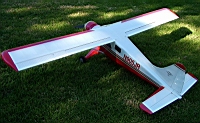

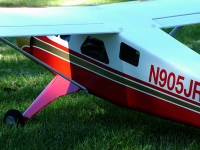
|
Statistics
Wing Span:
Length:
Root
Chord:
Tip Chord:
Flying
Weight:
Wing Area:
Wing Loading:
Power Setup:
Radio Setup:
Wheels and Landing Gear:
Useful Completion information
for this model:
In Use Low Range Throws:
|
1,735mm
1,090mm
215mm
215mm
About 1,980 grams, with 3S1P 2400mah battery
36.4dm²
55grams/dmē - light and easy!
- Designed primarily for electric power:
- Hardware setup: EMax BL2826 950kv, 700watt Outrunner brushless motor with
13" x 8" medium blade using a 3S1P 2400mah battery. This battery can
produce only 400 watts of power so the motor is a little wasted. It never gets
hot though!
- 60amp EMax controller.
- No extra weight was added to achieve
the required COG! Actually seemed very nose heavy all the time and currently
runs with a little up elevator. The battery cannot be moved back any further.
Spektrum DX7 transmitter with AR7000 receiver (full range) with 6 Hitec HS81 servos. Ailerons
and Flaps are "Y" joined requiring careful mechanical setup of each pair of
servos and linkages to avoid unwanted differential. Flaps are two stage (see
photos) and are very scale in appearance. Initial trims and mixes require some
down elevator when flap is applied. When the flaps mixed to elevator is
correctly setup, landings are a pleasure. Wing misalignment/twist requires a
little right aileron and rudder trim!
Easily the best undercarriage "out of the box"!. Very strong and no-nonsense.
COG: The nominated 57 to 70mm from leading edge resulted in dive outs so I am
using about 75mm and even then, with a little up elevator trim, the tendency
is to dive! I must add tail weight - sacriledge.
- Elevator - 15mm each way.
- Rudder - 25mm each way.
- Ailerons - 15mm each way.
- Flaps - 13mm half; 25mm full.
I always use some exponential for that smooth, scale effect when cruising. The
rudder throw was greatly reduced from specified because it created excessive
roll response due, in the main, to wing dihedral. The rudder's roll response
reminds me very much of the days of 2 channel "rudder and elevator" only
flight. |
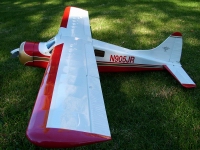 |
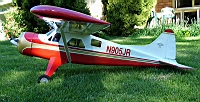
Built for electric setup with a small,
magnetically retained hatch just behind the cowl on the underside of the
fuselage. |
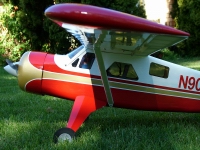
Sweet! |
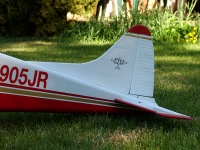
Tail profile peculiar to the DHC Beaver . |
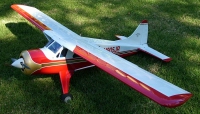 |

Very robust landing gear on this craft. |
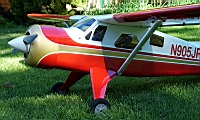 |
 |
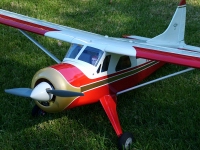
I used the large spinner to hide the fact that
the false radial motor could not fit in the cowl because of the controller
location, right out front below the motor. |
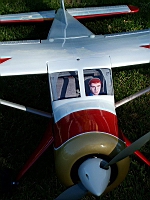 |
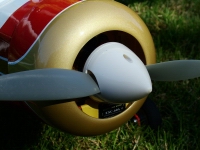
Observe the EMax 60 amp controller hogging the
incoming air stream. 60 Amp is a lot of overkill since the little 3S battery can
only raise 40 amps on a good day. |
 |
 |
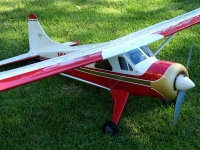 |
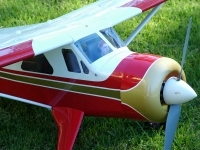 |
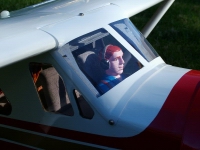
The most scale cabin to date. No receiver and
servos visible inside the cabin. All hiding below the false floor. |
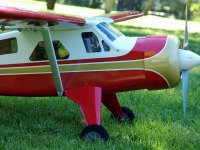 |
 |
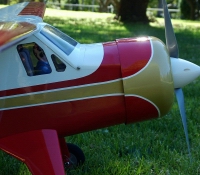 |
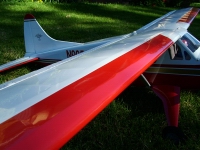 |
 |
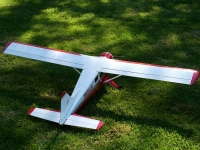 |
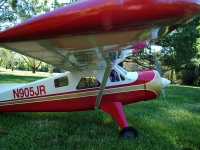 |
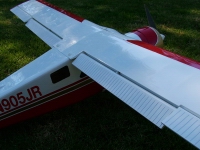
Flaps at half down for easy takeoff and slow
flight. |
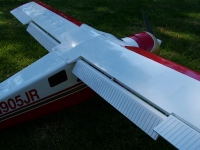 |

Flaps down for landing approach. |
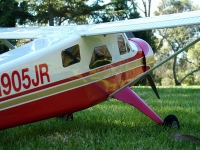 |
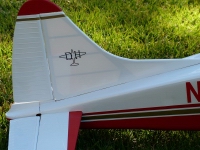 |

All tail end control is hidden inside the
fuselage. The rudder and tail wheel are actually separately driven from a single
servo! |
|
|
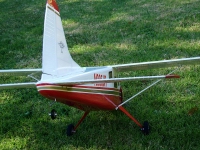
|